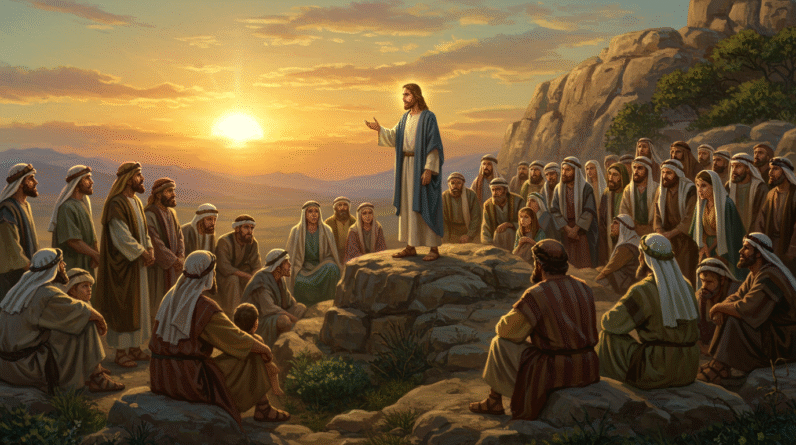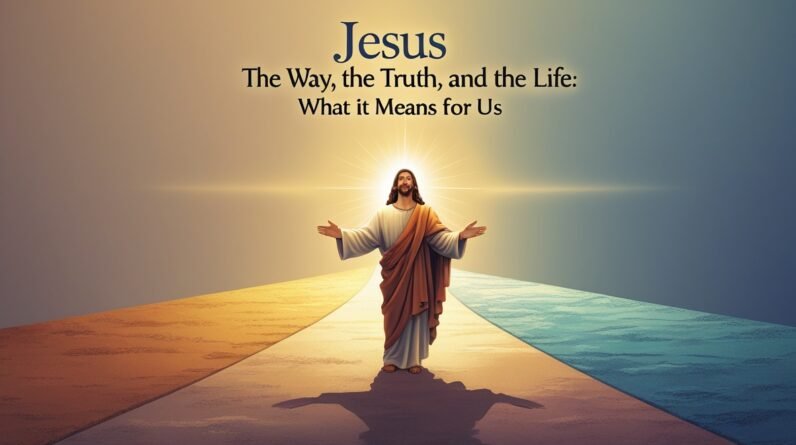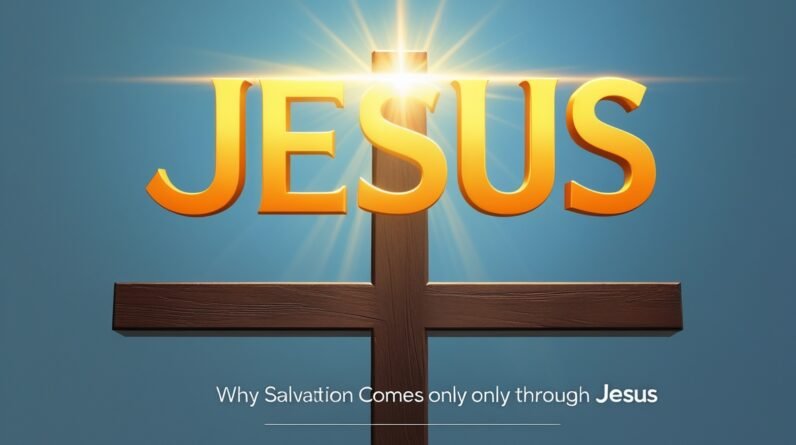Fully God, Fully Man: The Greatest Truth About Jesus Christ
When you hear the phrase Jesus Christ fully God fully man, you are standing at the very heart of the Christian faith. This is not merely a theological puzzle or a line in a creed — it is the good news that shapes your life, your hope, and your eternity. The claim that Jesus is both fully divine and fully human tells you who God is and how God has reached down to you. It explains how justice and mercy meet, how sin is dealt with, and how you can be reconciled to your Creator.
Jesus Christ fully God fully man is a truth the church has confessed from the beginning. It is rooted in Scripture and lived out in history. In what follows, you’ll see a clear, pastoral explanation of this truth, grounded in the Bible, and offered in a spirit of love and simplicity so you can know what this means for your life today.
Why does the truth that Jesus Christ fully God fully man matters to you
This doctrine matters because it answers the deepest questions you face: How can a holy God forgive sinners? How can you be sure of salvation? How do you find a Savior who truly understands your weakness and yet has the power to save?
When you accept that Jesus is fully God, you know that his work is effective — he has the power and authority to forgive sins and to raise the dead. When you accept that he is fully man, you know he can sympathize with your struggles and stand with you in temptation. The union of these two natures, one Person, means your Savior is both powerful enough to save and compassionate enough to understand. That is why the simple confession Jesus Christ fully God fully man changes everything.
The biblical foundation for “Jesus Christ fully God fully man”
If you want to root your faith in Scripture, the Bible gives clear and consistent testimony that Jesus is both God and man. The Old Testament prepares the way with promises and shadows; the Gospels show the incarnation in action; and the Epistles and Hebrews explain the theological significance. Together they form a witness that you can trust.
You can start with the opening of John’s Gospel, which places Jesus at the side of God in the beginning and yet shows him becoming flesh to dwell among us. Read this passage and feel how Scripture links divinity with humanity in one Person: John 1:1-14.
Old Testament shadows and prophecies
Long before the nativity, the Scriptures pointed forward to the coming Messiah — a Savior with divine claims and human roots. Isaiah speaks of a child given to us and calls him “Mighty God, Everlasting Father, Prince of Peace” in a prophecy that anticipates one who is both divine and yet born as a child: Isaiah 9:6. Isaiah also speaks of a virgin conceiving and bearing a son, a sign of God’s intervention in human history: Isaiah 7:14.
The Psalms likewise anticipate a ruler who will sit at God’s right hand, a figure whose authority is not merely human: Psalm 110:1. These Old Testament texts prepare your heart to see the wonder of the incarnation — God entering time and space to redeem a lost world.
The witness of the Gospels
When you read the Gospels, you see the mystery of God made human. John’s first chapter declares Jesus as the eternal Word, who was with God and was God, and who became flesh to live among us: John 1:1-14. Matthew points to fulfillment of prophecy and to a child called Emmanuel — “God with us” — in his account of Jesus’ birth: Matthew 1:23.
Luke, who carefully investigated all that Jesus did, stresses the genuine humanity of Jesus — his growth in wisdom and stature, and the reality of his life in history: Luke 2:52. The Gospels show you a Savior who walked the dusty roads, who laughed, who wept, who was hungry and tired, and yet who taught with authority that comes from God himself.
The testimony of the Apostles and Hebrews
The New Testament letters and Hebrews make clear why Jesus had to be both God and man. Paul teaches that in Christ all the fullness of deity dwells in bodily form: Colossians 2:9. He explains how Jesus humbled himself, taking the form of a servant and being obedient to death, even death on a cross: Philippians 2:5-11.
Hebrews shows you how the Son, being divine, sustains all things, and yet, by becoming human, is able to be our merciful and faithful high priest who can sympathize with your weaknesses: Hebrews 1:3 and Hebrews 4:15-16. The writer of Hebrews also explains that Jesus shared in flesh and blood so that he might destroy the power of death and free those held in slavery by fear: Hebrews 2:14-18.
These passages show that Jesus’ two natures are not merely incidental; they are essential to the rescue of sinners — including you.
The doctrine explained: Incarnation and the hypostatic union
You may have heard theological terms like “incarnation” and “hypostatic union.” Don’t be intimidated — these words help you grasp simple but profound realities: the incarnation means God the Son took on human flesh; the hypostatic union names the mystery that in Jesus there are two natures, divine and human, united in one Person.
When you say Jesus Christ fully God fully man, you are affirming that the one Person of Jesus possesses both natures without mixture, confusion, division, or separation. The Chalcedonian formula of the early church put it this way so you can trust that Scripture is consistent in affirming both the deity and humanity of Christ.
What does “incarnation” mean for you?
The incarnation means God did not stay distant. God came near. In Jesus, the divine Son entered your human experience. He was not a phantom or a mere spirit; he became truly flesh and truly human. That matters to you because it means he knows what human life is like from the inside. He knows your sorrows, your temptations, your disappointments — and he has entered into them to redeem them.
The apostle John wrote, “The Word became flesh and made his dwelling among us” John 1:14. If you are carrying a heavy burden, you can approach a Savior who has walked the path and who invites you to lay your burden on him.
How can one person be fully God and fully man?
This is a mystery you accept by faith, revealed in Scripture. Two distinct natures exist in Christ, but they belong to one Person. He is not part-God and part-man; he is fully God and fully man. The early church hammered this out because it matters: if Jesus were not fully God, he could not perfectly bear the judgment of sin on behalf of humanity; if he were not fully man, he could not represent humanity or rise in our nature.
The Bible presents Jesus making divine claims — forgiving sins, accepting worship, and claiming eternal pre-existence — while also experiencing human limitations, hunger, fatigue, and temptation. You see both realities in the same Person, and you are called to trust what God has revealed even when human language strains to contain the mystery.

The practical implications of Jesus being fully God and fully man
This truth is not merely doctrinal; it has enormous implications for your salvation, your worship, and your daily life. Because Jesus is both God and man, his work on the cross is uniquely effective, his resurrection is victorious, and his ongoing ministry for you is personal and powerful.
Salvation: justice and mercy meet
If you are wondering how God can be just and still forgive sin, the life, death, and resurrection of Jesus provide the answer. Because Jesus is truly God, he can bear infinite worth; because he is truly human, he can represent you. On the cross, justice was satisfied and mercy was unleashed. The prophet Isaiah speaks of One who was pierced for our transgressions and crushed for our iniquities so that we might be healed: Isaiah 53:5.
Paul explains that God presented Christ as a sacrifice of atonement, showing his righteousness in the present time so that he might be just and the one who justifies those who have faith in Jesus: Romans 3:23-26. That means when you come to Jesus in repentance and faith, justice and grace meet in a way you could never engineer yourself.
Love demonstrated and love experienced
Because Jesus is fully God, his love is divine and unwavering. Because he is fully man, he demonstrates that love in a human life and death. Romans tells you plainly that God demonstrates his love for you in that while you were still a sinner, Christ died for you: Romans 5:8. John writes that God sent his only Son into the world so that we might live through him: 1 John 4:9-10.
This means the love you need is not abstract. The love of God met you where you are, took on human flesh, and bore your shame on the cross so you could be reconciled to him.
A mediator who understands and intercedes
Because Jesus is fully man, he can represent you; because he is fully God, his intercession has divine efficacy. The New Testament calls him our mediator and high priest: 1 Timothy 2:5 and Hebrews 4:15-16.
When you pray, you approach a throne where Jesus intercedes for you. He knows your weakness because he shared in it, and he pleads for you with divine authority. That is a comfort when you feel weak, tempted, or overwhelmed.
Victory over death and hope for resurrection
If Jesus were merely human, his death would be tragic but not salvific; if merely divine, he could not truly die. Because he is both, his resurrection is the guarantee of your future. The Apostle Paul says that God raised Jesus from the dead, and because he was raised, you have the promise of new life: Romans 8:34 and Colossians 1:15-20.
You can hold fast to hope because the One who overcame death did so in your nature and for your sake.
An example for your life
Jesus’ humanity gives you a model to follow. He showed you how to pray, how to serve, how to trust the Father, and how to live a life of humble obedience. Philippians recounts his humility — though he was in very nature God, he emptied himself and became obedient to death: Philippians 2:5-11.
When you seek to follow Jesus, you follow One who both shows you the way and has the power to enable you to walk it.
Pastoral application: How you should respond
Now that you understand that Jesus Christ fully God fully man, what should you do? The Bible calls you to respond in repentance, faith, worship, and obedience. This is not about adding good deeds to your checklist; it is about turning from sin and trusting in the person and work of Jesus.
Begin with repentance. Admit to God that you have sinned and fall short of his glory Romans 3:23. Then put your faith in Jesus — the one who is able to save you because he is both God and man. Acts records Peter’s bold declaration after Pentecost: “God has made this Jesus, whom you crucified, both Lord and Messiah”: Acts 2:36. That Lordship invites your trust.
Worship follows belief. When Thomas encountered the risen Christ, he cried out, “My Lord and my God!”: John 20:28. Your worship is not abstract admiration but a submission of your life to Jesus’ authority. Finally, obedience flows from love. When you love Jesus, you keep his commands and walk in his ways.
Answers to common objections and questions
You may have honest questions. How can God suffer? How can Jesus be sinless if he was truly human? These are real concerns, and Scripture addresses them.
How could God suffer? The Son of God took on human nature and experienced real suffering without ceasing to be God. Suffering in his human nature does not imply change in the divine nature; rather, it demonstrates the depth of God’s love — willing to enter suffering to redeem you. Isaiah’s suffering servant points to this mystery: Isaiah 53:5.
How was Jesus without sin yet fully human? Scripture teaches that Jesus was born of a woman, like you, yet he lived a sinless life because he lived in perfect communion with the Father, relying on the Spirit. Hebrews tells you he was “tempted in every way, just as you are—yet he did not sin”: Hebrews 4:15. His sinlessness is essential for his role as the spotless Lamb who takes away sin.
Some ask whether this doctrine is a later invention. The New Testament testimony — from the Gospels to the Epistles to Hebrews — is consistent in presenting Jesus as divine and human. The early church councils sought to preserve that apostolic teaching because it matters for your salvation.
How Jesus’ divine and human nature brings together God’s love and justice
Here is the heart of the matter: you worship a God who is both perfectly just and perfectly loving. The justice of God demands that sin be addressed; the love of God longs to forgive and restore. In Jesus Christ fully God fully man, you find the meeting point of justice and mercy.
The cross is where divine justice and divine love converge. God’s righteousness required the penalty for sin to be paid; God’s love provided the ransom. Romans explains that God presented Christ as a sacrifice of atonement, so that he might be just and the justifier of the one who has faith in Jesus: Romans 3:25-26. On the cross, God did not abandon justice; he fulfilled it in his own Son. At the same time, God poured out his love in the sacrificial death of Christ: Romans 5:8.
Because Jesus is fully God, his sacrifice has infinite worth; because he is fully man, it truly represents you. That is how love and justice are reconciled — not by cheap grace, not by ignoring sin, but by God himself taking the penalty upon himself in the person of Jesus.
This is the greatest truth about Jesus Christ, and it changes everything for you. It means your forgiveness is secure because it rests on the work of the One who is both your God and your brother. It means your longing for justice is not left unanswered because the righteous Judge has acted through his Son. It means your heart can be filled with awe at the magnitude of God’s love and reverence for his holiness.
Living under the lordship of Jesus Christ fully God fully man
When you grasp that Jesus Christ fully God fully man, your everyday life should reflect that reality. Worship becomes central. Prayer becomes candid and confident because you pray to a Savior who understands and intercedes. Your moral choices find their standard in the life and teaching of Christ. Your mission becomes clear: to live and speak of the One who has reconciled you to God.
You will find in Scripture practical directions on how to live under his lordship. Jesus taught you to love your neighbor, to forgive as you have been forgiven, and to seek first the kingdom of God [Matthew 6:33 — link if desired]. He modeled sacrificial love and humble service. You are called to follow his example, powered by his Spirit, and sustained by the hope of resurrection.
If you are struggling to live this out, remember you are not alone. The same Jesus who lived in humility and obedience now lives to intercede for you and give you grace. Hebrews reassures you that you may approach the throne of grace with confidence to receive mercy and find grace to help in time of need: Hebrews 4:16.
A simple summary you can hold to
If you would take one thing away, let it be this: Jesus is the bridge between God and humanity. He is the eternal Word who became flesh; he is God with us; he is both judge and savior; he is your brother and your Lord. The phrase Jesus Christ fully God fully man is not a theological curiosity — it is the announcement of rescue.
If you believe, you are brought into right standing with God because of what he has done in Jesus: you are forgiven, you are loved, and you have the promise of new life. If you have not yet placed your trust in him, know that he invites you today to come to him. Paul writes that God sent his Son, born of a woman, to redeem those under the law so that you might receive adoption to sonship: Galatians 4:4-5.
If your heart is burdened, come to the One who is both powerful and compassionate. Come to the One who says, “I came to seek and to save the lost” Luke 19:10. Come to the One who is able to put away sin because he is God and who took on your flesh to bear your sorrows.
Invitation and pastoral encouragement
You have been given a great invitation: to trust in Jesus Christ fully God fully man. That trust begins with turning from self-reliance and trusting in the person and work of Jesus for your forgiveness. If you have already trusted him, be encouraged to walk in the freedom he has provided. If you wrestle, bring your doubts and questions to the Bible and to prayer. Seek the company of faithful brothers and sisters who will walk with you in the truth.
The gospel is simple: Christ died for sinners, rose for your justification, and reigns now to intercede for you. The apostle Paul calls you to press toward the goal of knowing Christ and the power of his resurrection: [Philippians 3:10 — you can read this in your Bible for encouragement]. Keep your eyes fixed on Jesus, who is both your hope and your salvation.
Final reflections: why this truth is the “greatest truth”
Why call Jesus Christ fully God fully man the greatest truth? Because it alone answers the questions that matter most: How can you be forgiven? How can you be known and loved by God? How can justice be satisfied and mercy given? In Jesus, God himself took your place, dealt with sin, and opened the way to eternal life.
This truth calls forth worship, repentance, obedience, and hope. It guarantees that the love of God that reached out to you is not shallow; it is the love of the One who is infinite and who stooped to take your human nature upon himself. Your response should be simple and resolute: repent, believe, and follow the Lord Jesus.
If you would let this truth sink deep into your heart, begin with a simple prayer: confess your need, thank God for Christ’s work on the cross, and ask Jesus to be your Lord and Savior. The New Testament invites you to place your faith in Jesus, who is Lord and Christ: Acts 2:36. Make that step today, and you will find that the God who is both just and loving has acted on your behalf.
If you are already a follower, let this truth shape everything you do. Preach it to yourself in times of doubt. Trust it in times of trial. Offer it to those who are lost. Jesus Christ fully God fully man is the rock upon which you can build your life.
Explore More
For further reading and encouragement, check out these posts:
👉 7 Bible Verses About Faith in Hard Times
👉 Job’s Faith: What We Can Learn From His Trials
👉 How To Trust God When Everything Falls Apart
👉 Why God Allows Suffering – A Biblical Perspective
👉 Faith Over Fear: How To Stand Strong In Uncertain Seasons
👉 How To Encourage Someone Struggling With Their Faith
👉 5 Prayers for Strength When You’re Feeling Weak

📘 Jesus and the Woman Caught in Adultery – Grace and Mercy Over Judgement
A powerful retelling of John 8:1-11. This book brings to life the depth of forgiveness, mercy, and God’s unwavering love.
👉 Check it now on Amazon
As a ClickBank & Amazon Affiliate, I earn from qualifying purchases.
Acknowledgment: All Bible verses referenced in this article were accessed via Bible Gateway (or Bible Hub).
“Want to explore more? Check out our latest post on Why Jesus? and discover the life-changing truth of the Gospel!”








